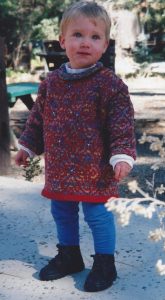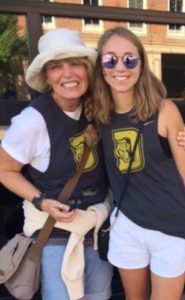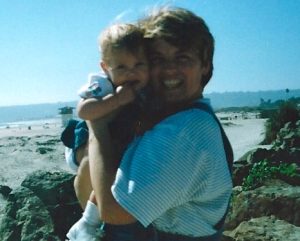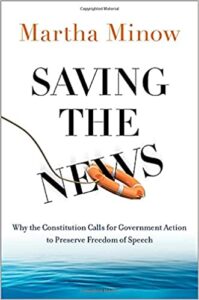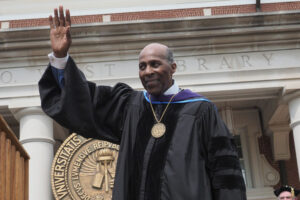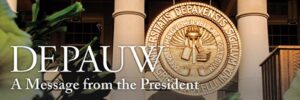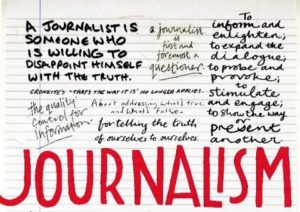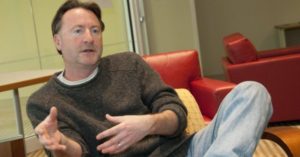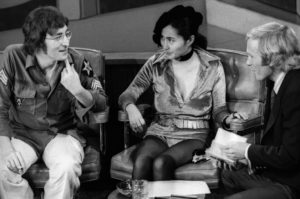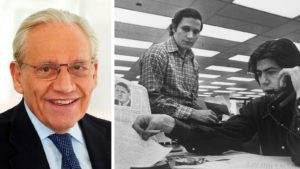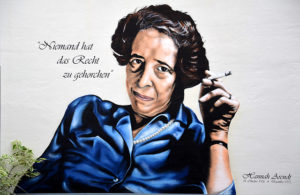DePauw University
Dayle in Limoux – Day #80
September 23, 2022St. Salvayre
When your girl needs to find a signal to connect for a virtual work meeting while exploring ancient ruins in a little hamlet in France called St. Salvayre.
Finds it…
Then…
Cue the sheep. :) “Wait. Annie, are those cow bells???”
One year ago today, Annie Glenn was notified of her new job offer to a new company! And today, a massive promotion announced.
She came down to my room to share the news! No one…no one…has worked harder. 4.0 through high school, all four years of undergrad at DePauw University, Phi Beta Kappa, the nation’s most prestigious honor roll society, graduating summa cum laude. Same for her master’s degree from Georgia Tech…4.0. Her diligence, her discipline, her sense of self. No one could deserve this more. Her maman’s le coeur is bursting with happiness for her success. Thank you, Coronado School District in California, Blaine County School District in Sun Valley, Idaho, and DPU, and Grace Hopper, and Honeywell Aerospace, and now, KSG.
W
O
W
Très bon, sweet girl. Très bon. Not too shabby for 26
And, in F R A N C E!
Celebrate good times, gratitude, and g r a c e.
W
O
O
~
H
O
O
Annie Glenn and her maman, Sun Valley, Idaho.
ℒℴve ❥
À bientôt.
Inhaling grace, exhaling gratitude, dear Gaia, Mariam, Sophia, Joan and Catherine, Bobby D, Alma Evalo Latta, and Darrell Lee. Thanks be to y o u. jai
Dayle in Limoux – Day #54
August 28, 2022H A P P Y
B
I
R
T
H
D
A
Y
A N N I E G L E N N!
It’s my girl’s 26th today! She’s back in France with Michael, her boyfriend, mid-September to celebrate with Blanquette and gâteau!
We need a birthday celebration in Languedoc! Hurry!
I miss you so much.
{xxoo}
Happy~Happy!
‘On the day that you were born the angels got together
And decided to create a dream come true
So they sprinkled moon dust in your hair of gold and starlight in your eyes of blue…’
“The constitution is not a suicide pact.”
July 27, 2021“We can and must do more to regulate and support distribution of reliable news.”
CNN public editor: Why CNN’s audience deserves federally regulated news
by Ariana Pekary
Ariana Pekary is the CJR public editor for CNN. She was an award-winning public radio and MSNBC journalist for two decades. Now she focuses on the systemic flaws of commercial broadcast news. She can be contacted at publiceditors@cjr.org.
CNN, AS I’VE WRITTEN BEFORE, has amplified disinformation, relies on panel discussions that increase polarization, and has neglected voices of moderation for the sake of ratings. But is there some way to mitigate such problems, which are so common in cable news? Martha Minow, a professor at Harvard Law School, argues that the Constitution requires efforts to protect the free press––including regulation.
In Saving the News, Minow describes the merits of “deep and extensive government involvement in funding, shaping, and regulating media.” Some may balk at the notion of federal intervention in the news. But Minow chronicles how the government has granted newspapers low postal rates, invested in research that created the internet, established licensing protocols for broadcasters, and regulated telephone lines and features of digital platforms––involving itself in essential elements of the nation’s media infrastructure.
“If the ecosystem fails to provide necessary information to citizens,” she told me, “then democracy dies—and the Constitution is not a suicide pact.”
Minow argues that the First Amendment implies the existence of a functional press, so the government has an obligation to enact reforms and regulations to protect it. Many consider the industry to be a public utility, and therefore subject to regulation. And, as Minow explains in Saving the News, “Regulation of a necessary good or service also helps guard against coercion that works by exploiting people’s dependence, but it still permits private owners to operate for profit.”
The now-defunct Fairness Doctrine, which mandated journalistic balance by requiring broadcasters to air multiple viewpoints, is one example of successful oversight, Minow said. Supreme Court justices wrote in 1969 that it was a “protection for ‘the right of the viewers and listeners, not the right of the broadcasters.’ ” Public interest, Minow notes, is a vital characteristic of government intervention. Accordingly, we may deduce that the public has authority over an outlet like CNN to protect the audience.
The United States has a long, if forgotten, history of funding the news media.
In The Death and Life of American Journalism, Robert McChesney and John Nichols––cofounders of Free Press, a media reform group––calculated that “the level of government subsidy given to the American press in the 1840s was the equivalent of $30 billion in 2010 dollars.” But federal funding of public media amounted to just $465 million in 2020––an extraordinarily low amount compared with other countries.
Subsidizing public media, Minow told me, would “provide crucial competition and can stimulate for-profits to win viewers by doing better.” Sesame Street, for example, did not exist before broadcasters knew that the format would be popular. Now it’s competitive and profitable. We could use other public-private partnerships, similar to the current collaboration with ProPublica, to create new informative TV programs, she says, calling it a “public option” for journalism.
Other possibilities include tax incentives; for instance, if CNN adopted a certain set of ethical standards (see the Society of Professional Journalists’ as an example), then it could receive tax benefits for implementing procedures in the public interest. Minow said the government could also encourage measures to label news programming, to more clearly “distinguish news, analysis, and opinion.”
As a democratic nation, we may have lost sight of the need for an informed electorate. Commercial outlets dominate our media environment. But in Saving the News, Minow reminds us of our constitutional obligations. We can and must do more to regulate and support distribution of reliable news. CNN’s audience deserves it. All American audiences do.
The Society of Professional Journalists is the former Sigma Delta Chi, founded at DePauw University.
Vernon E. Jordan ’57
March 2, 2021DePauw mourns the death of civil rights leader Vernon Jordan ’57
Vernon E. Jordan ’57, a tenacious civil rights leader and a trusted adviser to American presidents, died last night. He was 85.
Jordan grew up in Atlanta but chose to come north to attend DePauw University for his higher education. He knew he would stand out as an African-American matriculant from the segregated South, and he was the only Black student in the Class of 1957 and one of only five African Americans in the student body when he first stepped onto campus.
While at DePauw, Jordan immersed himself in the student senate, excelled in oratorical contests and, by his own reckoning, was something of a big man on campus.
He later said of DePauw: “I love this place – DePauw – because it prepared me to lead the life I have been blessed to live. If I were to enumerate all the great gifts this university gave me, everything I learned, or all that my education made possible, I would need at least another four years.
“But, in the interest of time – and the desire to avoid additional tuition payments – I’ll say this: DePauw University nurtured my growth and maturity. I made lasting friendships here. And if I had my life to live over again, I would return to this place.”
Said DePauw President Lori S. White: “Our community mourns the passing of Vernon Jordan, a member of the Class of 1957. DePauw University has lost a dear friend and the world has lost a determined leader. He spoke loudly – through words and deeds – as a civil rights activist and quietly as a trusted counsel to presidents. DePauw is better for having had him as a beloved alumnus, and the country and the world are better for having him as a leader.”
After DePauw, Jordan graduated from the Howard University School of Law and quickly established himself as a leader. He became a close adviser to President Bill Clinton and one of the most powerful Black executives in America, known as “the Rosa Parks of Wall Street.”
He was first in the public eye soon after graduating law school, when his law firm won a lawsuit on behalf of two Black students – including Charlayne Hunter, who would add “-Gault” to her last name and go on to be a renowned journalist – to be admitted to the University of Georgia. A year later, he became Georgia field director for the NAACP, organizing voter-registration drives and boycotts of businesses that refused to hire African Americans. In 1964, he became director of the Voter Education Project of the Southern Regional Council. He became executive director of the United Negro College Fund in 1970, followed by nine years as president and chief executive officer of the National Urban League. He joined Akin Gump Strauss Hauer & Feld LLP in Washington D.C. in 1982, where he most recently was senior counsel; he also worked as senior managing partner at Lazard Frères & Co. LLC in New York since 2000.
In political circles, Jordan was best known as a close friend and adviser to President Clinton, for whom he ran the transition process in 1992. He had relationships with other presidents for virtually his entire professional life: President Johnson tapped him in 1966 to participate in the White House Conference on Civil Rights. President Nixon invited him to the White House in 1971, when Jordan informed the president he intended to be as candid as his Urban League predecessor had been. President Carter offered him two cabinet positions – both of which Jordan declined – and visited Jordan in the hospital in 1980 after the civil rights activist was shot by an avowed racist in Fort Wayne, Indiana. Jordan met regularly with President George H.W. Bush during negotiations over the Civil Rights Act of 1990. President George W. Bush took friendly jabs at Jordan when speaking to the Economic Club of Washington, of which Jordan was president. And President Obama, a long-time friend, celebrated Jordan’s 80th birthday in 2015.
Jordan wrote an autobiography, “Vernon Can Read: A Memoir,” and a compendium of his speeches, “Make It Plain: Standing Up and Speaking Out.” He was among the civil rights leaders interviewed at length and featured in Robert Penn Warren’s 1965 book “Who Speaks for the Negro?” He recently was the subject of a documentary, “Vernon Jordan: Make It Plain,” a chronological retelling of his life.
Jordan returned to the DePauw campus often and was the commencement speaker in 1973, 1993 and 2018. He received numerous awards: in 2018, the Anti-Defamation League’s Lifetime Achievement Award; in 2017, Harvard Law School Center on the Legal Profession’s Award for Global Leadership; in 2014, The American Lawyer magazine’s Lifetime Achievement Award and the Hubert H. Humphrey Public Leadership Award from the University of Minnesota’s Humphrey School of Public Affairs; in 2009, the W.E.B. DuBois Medal from Harvard University; in 2003, the Trumpet Award; in 2001, the Joel E. Spingarn Medal from the NAACP; in 1993, the McNaughton Medal for Public Service from DePauw University; and, in 1969, the Old Gold Goblet from DePauw. He has received honorary degrees from more than 70 colleges and universities, including DePauw.
Jordan sat on a number of boards of corporations and organizations and was an advisory member of the DePauw Board of Trustees.
www.depauw.edu/stories/details/depauw-mourns-the-death-of-civil-rights-leader-vernon-jordan-57/
|
Dear DePauw Alumni, It is with a heavy heart that I share the news that Vernon Jordan, a proud DePauw graduate and globally renowned civil rights leader, has passed away. He was beloved by not only the DePauw family, but by countless people the world over whose lives he profoundly changed or influenced. We are blessed to have called him one of our own. Below is a link to our news announcement. Sincerely, |
|
|
|
Lori S. White, Ph.D. President |
When Jordan attended DePauw, due to segregation and racism, Jordan could not go into the local bar in Greencastle, Indiana for a beer, or join a fraternity.
Yet, Jordan wrote in his memoir:
“I was the only Black participant and was not at all uncomfortable. This as the way it was going to be. I had chosen this path.
“One of the good things about going to a school in a small town is that everything that happens there commands great attention. There’s no competing entertainment. When the four of us gathered to give our speeches in East College, we were before a capacity crowed. My topic was “The Negro in America,” a subject I’d been talking about since I was fifteen years old. I feel comfortable with that. I did my best, and I won.”
“Although Indiana is above the Mason-Dixon line, it has a tough history regarding race. For a time, it had the largest and most active chapters of the Ku Klux Klan in the country. It was a mess in the 1920’s and 1930’s. When I was there in the 1950’s, it wasn’t exactly a racial utopia.”
“There was, of course, the U.S. Supreme Court’s 1954 ruling in Brown v. Board of Education, and a year later, in December of my junior year, word came from Montgomery, Alabama, of the boycott of city buses in response to Rosa Park’s refusal to move to the back of the bus. Leading the boycott was the Reverend Martin Luther King, Jr., the young preacher from Atlanta. King’s reputation had grown considerably since the day he had officiated at my brother Warren’s weeding. With Montgomery, he became a figure of world-wide renown.”
Later, Jordan would say of DePauw:
“I love this place – DePauw – because it prepared me to lead the life I have been blessed to live. If I were to enumerate all the great gifts this university gave me, everything I learned, or all that my education made possible, I would need at least another four years.”
W G R E
March 9, 2019“WGRE first went on-air April 28, 1949 as the first FCC licensed educational radio station.”
DePauw University
WGRE: The First 50 Year Anniversary [2009]
Audio Player Audio Player Audio Player Audio Player Audio Player
Renaissance For Truth & Accuracy
August 11, 2018Boston Globe Calls For Nationwide Media Response To Trump’s Attacks On The Press
Woodstein U: Notes on the Mass Production and Questionable Education of Journalists
“There is an inextricable link between repressing the freedom of the press and repressing the freedom for civil society to campaign for their rights. Both are an attempt to repress “inconvenient truths,” silencing protesting voices, and dimming the spotlight on illegal activity perpetrated by individuals, companies, and governments in power. And both deserve the world’s attention.”
The late Ben Bagdikian, who wrote a cover story for The Atlantic in March 1977 on the so-called Woodstein phenomenon, summed it up like this: Bob Woodward and Carl Bernstein “were young, inexperienced, and not particularly promising in the eyes of their superiors. Working in a city and on a paper where the country’s most celebrated journalists were in top command, the two beginners beat them all and became national heroes … If they could do it, why couldn’t every high school student?”
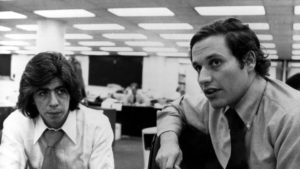
Washington Post writers Carl Bernstein, left, and Robert Woodward, who pressed the Watergate investigation, are photographed in Washington, D.C., May 7, 1973. It was announced that The Post won the Pulitzer Prize for public service for its stories about the Watergate scandal. (AP Photo)
But one experienced news director at a major television station said: “I prefer someone who majored in sociology or architecture or art history or psychology rather than somebody who spent a year or two learning how to put a film story together. One of our best reporters was a Rhodes scholar specializing in Florentine history. Given the nature of politics in this city. I don’t think that expertise in Machiavellian politics is such a bad idea.”
The people who hire journalists say they are divided on the value of journalism schools. But what about practitioners of journalism who, with the benefit of years of experience, can look back and judge for themselves? Did journalism graduates distinguish themselves over non-journalism graduates?
I wrote to fifty-three journalists who have won Pulitzer Prizes over the last ten years. Of those who responded. 75 percent did not major in journalism, most having degrees in English. English literature, history, or philosophy. Three did not attend college.
These Pulitzer Prize-winners were largely hostile to the idea of journalism schools and most of those approving a journalism degree specified that they favored a different undergraduate degree with journalism solely in a year of graduate work.
“THE POLITICS OF DISTRACTION” TROUBLE MEDIA STUDIES PROF. KEVIN HOWLEY
August 10, 2018
[A newspaper column from DePauw University Professor Kevin Howley takes media to task for being distracted from real issues by rhetoric.]
“Ever since [DT] announced his candidacy, the news media has followed his Twitter account with all the anticipation and credulity of a child on Christmas morning,” according to Kevin Howley, professor of communication at DePauw University. In a newspaper column, Howley continues, “Eager to publish — and profit handsomely from — the latest presidential tweet storm, an obliging press corps rewards Trump’s narcissism as it normalizes his authoritarianism.”
After the president tweeted last week that Attorney General Jeff Sessions should end the ongoing ngoing Special Counsel investigation into Russian interference in the 2016 presidential election, “Reporters and pundits spent the better part of the news cycle parsing the president’s words and debating whether this latest episode constitutes obstruction of justice,” Dr. Howley observes. “What’s most troubling about all of this is how willingly reporters and editors participate in Trump’s politics of distraction.”
In Howley’s view, the media’s myopic obsession with the president amount to “endless distractions that prevent us from addressing vital problems, like climate change and the health care crisis, that require immediate attention.”
The professor’s op-ed concludes, “The Romans knew a thing or two about the politics of distraction. They called it ‘bread and circuses.’ We call it ‘fake news.’ Despite, or perhaps because of the spectacle, the Roman Empire collapsed under its own imperious weight. Maybe there’s a lesson in that for the American Empire.”
You’ll find the complete text at the website of Indiana’s Kokomo Tribune.
Dick Cavett in the Digital Age
Stopping to smell the flowers with the last great intellectual talk-show host.
“Well, that’s an awkward subject matter for me, because I know all of them,” Mr. Cavett, 81, said on a recent sunny Thursday afternoon at his sprawling country house in Connecticut. “I’m not addicted to talk shows. God knows, I’ve spent enough time on them.”
As in Mr. Cavett’s 1960s and ’70s heyday, the country is in a period of turbulence, with racial tensions flaring, protests in the streets, and a fundamental ideological fissure. The hosts who have emphasized substance, who have “gone political,” have been praised and nominated for Emmys.
But “the next Cavett”? Is such a thing possible?
If only.
For three decades, Mr. Cavett was the thinking person’s Johnny Carson, embodiment of an East Coast sophisticate. He wore smart turtlenecks and double-breasted blazers, had more cultural references than a Google server and laced martini-dry witticisms into lengthy, probing talks with 20th-century luminaries including Bette Davis, James Baldwin, Mick Jagger and Jean-Luc Godard.
A Renaissance salon in a rabbit-ears era, “The Dick Cavett Show” was woke some 50 years before the term came into vogue. Viewers tuned in to see Muhammad Ali spout off about the Vietnam War or to see Yoko Ono in a 90-minute discussion with John Lennon.
While Mr. Cavett said he loathed Nixon’s politics, he called him “a brilliant, brilliant man” and was cordial to him in person. Years after Watergate, he remembers seeing the former president and his younger daughter, Julie, seated at an outdoor restaurant in Montauk, so he grabbed a menu and, posing as a waiter, began to list the specials: Yorba Linda cream pie, Whittier College soufflé.
Not his best material, Ms. Nixon told him.
The current president is perhaps the only celebrity over the age of 70 that Mr. Cavett has never met, other than being beaten by him to shrimp in a benefit buffet line years ago.
“I think all people who get to president of the United States must have something wonderful about them,” Mr. Cavett said in a mock-diplomatic tone.
“With that,” he added, “Cavett held a gun to his head and shot himself.”
AP Headline:
“Republicans promote fear, not tax cuts, in key elections”
[From space to borders, ‘fear is a contagion in a democracy.’]
“FEAR: Trump in the White House,” by Pulitzer Prize-winning journalist and bestselling author Bob Woodward, will be published by Simon & Schuster on Sept. 11th.
- “Drawing from hundreds of hours of interviews with firsthand sources, contemporaneous meeting notes, files, documents and personal diaries, FEAR brings to light the explosive debates that drive decision-making in the Oval Office, the Situation Room, Air Force One and the White House residence.”
- Jonathan Karp, president and publisher of Simon & Schuster: “‘FEAR is the most acute and penetrating portrait of a sitting president ever published during the first years of an administration.”
- “FEAR is Woodward’s 19th book with Simon & Schuster, beginning with ‘All the President’s Men’ in 1974. Each of the previous 18 books he authored or co-authored has been a national nonfiction bestseller. Twelve of those have been #1 national bestsellers.”
The WashPost’s Manuel Roig-Franzia writes that the “expected tenor of the book is underscored by its unsettling cover, an extreme close-up of a squinty-eyed Trump depicted through a gauzy red filter.”“The hush-hush project derives its title from an offhand remark that then-candidate Trump made in an interview with Woodward and Post political reporter Robert Costa in April 2016.
“DT said: “Real power is, I don’t even want to use the word: ‘Fear.’
“Woodward … has privately described the remark as ‘an almost Shakespearean aside.'”
Hope Reese, JSTOR Daily
The American philosopher Martha Nussbaum’s new book, The Monarchy of Fear, examines the politics of primal fear in the 2016 election.
In November 2016, the American philosopher Martha Nussbaum was in Tokyo preparing to give a speech when she learned of the results of the U.S. presidential election. Worrying about the implications of Trump’s victory, Nussbaum, who has long studied the philosophy of emotions, realized that she “was part of the problem.”
The examination of her own reaction resulted in Nussbaum’s latest work, The Monarchy of Fear––part manifesto, part Socratic-style dialogue about the large role that fear plays in our current political era and why it represents a serious danger to democracy. Nussbaum has explored a range of emotions in her work, and this book, she tells me, makes the case that “anger, disgust, and envy…are poisoned and made more disruptive by fear.” Fear, Nussbaum argues, is both a primal emotion, an impulse felt by infants, and an emotion shaped by social context as we become older. Fear is asocial, narcissistic––and often misguided. When we fear others, Nussbaum says, we are often not taking facts and information into account––and we are often perceiving dangers that don’t exist.
“The nature of fear is that it’s very volatile and it’s very easily hijacked by rhetoric.”
https://www.brookings.edu/blog/brown-center-chalkboard/2018/07/19/civics-education-should-be-about-more-than-just-facts/
The list of what ails the U.S. politically today is long and complicated, with problems as different as vast economic inequalityand gerrymandered congressional districts. But if we’re honest with ourselves, many of the country’s most serious problems exist within us, in the hearts and minds of its people. We shelter ourselves from perspectives and facts that disagree with our own. Our politics seem more rooted in contempt and schadenfreude than empathy and reason. Politicians exploit racial, ethnic, and class divisions, leaving many Americans feeling even more targeted and disenfranchised. And a foreign adversary disseminates false information through social media because it believes that Americans cannot (or won’t really care to) distinguish reality from manipulative fiction.
Those are shortcomings in our skills and dispositions. Do public schools have a role to play in developing them? We believe they do. Schools, more than any other public institution, are charged with preparing students for the responsibilities of civic life. Parents play a critical role, too, but schools are better positioned to ensure that all children have a core set of experiences. This includes developing skills that might not be on parents’ radar, like how to evaluate news disseminated over social media. Believing that schools ought to sharpen students’ civic skills and dispositions isn’t, as Finn suggests, a product of political correctness run amok, nor is it an inherently left-of-center idea. Americans have long seen this kind of thing as a core function of schools, and even Milton Friedman’s argument for vouchers is built on a notion that schools ought to instill a common set of values.
Perhaps Finn’s critique is that teaching facts is the way to develop civic skills and dispositions, or that students develop these skills and dispositions without schools teaching them explicitly. Perhaps rather than directly teaching news and media literacy or providing students with opportunities to engage in and experience the political process, schools should stick to teaching facts and modeling nice behaviors. We see that as a missed opportunity.
Hannah Arendt Explains How Propaganda Uses Lies to Erode All Truth & Morality: Insights from The Origins of Totalitarianism
In an ever-changing, incomprehensible world the masses had reached the point where they would, at the same time, believe everything and nothing, think that everything was possible and nothing was true… The totalitarian mass leaders based their propaganda on the correct psychological assumption that, under such conditions, one could make people believe the most fantastic statements one day, and trust that if the next day they were given irrefutable proof of their falsehood, they would take refuge in cynicism; instead of deserting the leaders who had lied to them, they would protest that they had known all along that the statement was a lie and would admire the leaders for their superior tactical cleverness.
The result of a consistent and total substitution of lies for factual truth is not that the lie will now be accepted as truth and truth be defamed as a lie, but that the sense by which we take our bearings in the real world—and the category of truth versus falsehood is among the mental means to this end—is being destroyed.
“We too,” writes Jeffrey Isaacs at The Washington Post, “live in dark times”—an allusion to another of Arendt’s sobering analyses—“even if they are different and perhaps less dark.” Arendt wrote Origins of Totalitarianism from research and observations gathered during the 1940s, a very specific historical period. Nonetheless the book, Isaacs remarks, “raises a set of fundamental questions about how tyranny can arise and the dangerous forms of inhumanity to which it can lead.” Arendt’s analysis of propaganda and the function of lies seems particularly relevant at this moment. The kinds of blatant lies she wrote of might become so commonplace as to become banal. We might begin to think they are an irrelevant sideshow. This, she suggests, would be a mistake.
Vernon Jordan
June 8, 2018“In so many ways, our challenge in our national life is to not let the exceptions become the rule,” Jordan told the crowd gathered in the Holton Memorial Quadrangle at DePauw University’s 179th commencement. “To not let fear and hatred become the rule. To not let a society that gets more divided become the rule. To not let falsehoods become the rule. To not let a lack of leadership, a lack of integrity, a lack of respect for others, become the rule.”
Vernon Jordan
DePauw University Commencement Speech
May 20, 2018
[Jordan is a 1957 graduate of DePauw University, civil rights legend, attorney and presidential adviser.]





